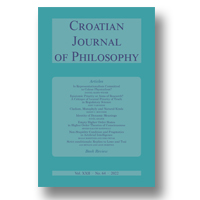|
articles |
|
1.
|
Croatian Journal of Philosophy:
Volume >
15 >
Issue: 1
Miguel López-Astorga
Chrysippus’ Indemonstrables and Mental Logic
abstract |
view |
rights & permissions
| cited by
Stoic logic assumes five inference schemata attributed to Chrysippus of Soli. Those schemata are the well-known indemonstrables. A problem related to them can be that, according to standard propositional calculus, only one of them, modus ponens, is clearly indemonstrable. Nevertheless, I try to show in this paper that the mental logic theory enables to understand why the Stoics considered such schemata to be basic kinds of arguments. Following that theory, four of them can be linked to ‘Core Schemata’ of mental logic and the only one that is more controversial is modus tollens. However, as I also comment, some assumptions of Stoic philosophy, which can be interpreted from the mental logic theory, can explain why this last argument was included into the set of the indemonstrablesas well.
|
|
|
|
|
2.
|
Croatian Journal of Philosophy:
Volume >
15 >
Issue: 1
Dušan Dožudić
Resisting the Restriction of the Propositional Attitude Class
abstract |
view |
rights & permissions
| cited by
It is a standard view among philosophers that an attitude is propositional if a that clause could represent its content. One way of challenging this view is to argue that attitudes whose content can be represented in that way have categorically different content. A number of authors adopted such a strategy and imposed various restrictions on the propositional attitude class. In this paper, I will argue that such restrictions are not tenable because the arguments that are used to support them turn against such restrictions as well. As a consequence, if one cannot adequately deal with these arguments from the perspective of the standardview, one is forced to discard generally the propositionality of attitudes, perhaps even their relational nature. I will consider a strategy for resolving this challenge in favour of the standard view.
|
|
|
|
|
3.
|
Croatian Journal of Philosophy:
Volume >
15 >
Issue: 1
Jasper Doomen
Of Mosquitoes and Men: The Basis of Animal and Human Rights
abstract |
view |
rights & permissions
| cited by
This article discusses the status of animal rights, and more particularly whether these rights may be defended from a natural rights perspective or from an ethical perspective. I argue that both options fail. The same analysis applies in the case of mankind. ‘Mankind’ does not bring with it the acknowledgement such rights, nor does a focus on what is arguably characteristic of mankind, namely, reason. Reason is decisive, though, in another respect, namely, the fact that reasonable beings can claim and lay down rights. It does not follow from this that animals should have no rights, since human beings may be motivated to constitute such rights, while this provides the most solid basis for them.
|
|
|
|
|
4.
|
Croatian Journal of Philosophy:
Volume >
15 >
Issue: 1
Hili Razinsky
A Live Language: Concreteness, Openness, Ambivalence
abstract |
view |
rights & permissions
| cited by
Wittgenstein has shown that that life, in the sense that applies in the first place to human beings, is inherently linguistic. In this paper, I ask what is involved in language, given that it is thus essential to life, answering that language—or concepts—must be both alive and the ground for life. This is explicated by a Wittgensteinian series of entailments of features. According to the first feature, concepts are not intentional engagements. The second feature brings life back to concepts by describing them as inflectible: Attitudes, actions, conversations and other engagements inflect concepts, i.e., concepts take their particular characters in our actual engagements. However, inflections themselves would be reified together with the life they ground unless they could preserve the openness of concepts: hence the third feature of re-inflectibility. Finally, the openness of language must be revealed in actual life. This entails the possibility of conceptual ambivalence.
|
|
|
|
|
5.
|
Croatian Journal of Philosophy:
Volume >
15 >
Issue: 1
Dwayne Moore
Mereological Essentialism and Mereological Inessentialism
abstract |
view |
rights & permissions
| cited by
Mereological essentialists argue that mereological summations cannot change their parts. Mereological inessentialists argue that mereological summations can change some or all of their parts. In this paper I articulate and defend a position called Moderate Mereological Inessentialism, according to which certain mereological summations can change some, but not all, of their parts. Persistent mereological summations occur when the functional parts of mereological summations persist through alterations to its spatial parts.
|
|
|
|
|
6.
|
Croatian Journal of Philosophy:
Volume >
15 >
Issue: 1
Chen Bo
Social Constructivism of Language and Meaning
abstract |
view |
rights & permissions
| cited by
To systematically answer two questions “how does language work?” and “where does linguistic meaning come from?” this paper argues for SocialConstructivism of Language and Meaning (SCLM for short) which consists of six theses: (1) the primary function of language is communication rather than representation, so language is essentially a social phenomenon. (2) Linguistic meaning originates in the causal interaction of humans with the world, and in the social interaction of people with people. (3) Linguistic meaning consists in the correlation of language to the world established by collective intentions of a language community. (4) Linguistic meaning is based on the conventions produced by a language community in their long process of communication. (5) Semantic knowledge is empirical and encyclopedic knowledge distilled and condensed, and the uses of language accepted by a linguistic community. (6) Language and meaning change rapidly or slowly as the communicative practice of a linguistic community does. The crucial point of SCLM is to focus on the triadic relation among language, humans (a linguistic community) and the world, rather than the dyadic relation between language and the world.
|
|
|
|
